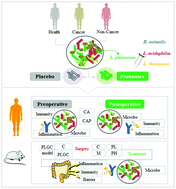Adjuvant treatment and molecular mechanism of probiotic compounds in patients with gastric cancer after gastrectomy†
Abstract
Gastrectomy is the main treatment for gastric cancer (GC) at present. Surgery improves the survival rate of patients, but the complications seriously affect the recovery and lack effective treatment measures. In the present study, probiotic compounds (4 strains; Lactobacillus plantarum MH-301 (CGMCC NO. 18618), L. rhamnosus LGG-18 (CGMCC NO. 14007), L. acidophilus and Bifidobacterium animalis subsp.lactis LPL-RH (CGMCC NO. 4599)), through clinical and animal model verification, were studied to try to find the auxiliary treatment measures after gastrectomy, and explore its potential mechanism. Clinical research results showed that probiotic compounds treatment could significantly lower postoperative inflammation, enhance immunity, resume gut microbiota composition and promote postoperative recovery. The results in rat models indicated that gastrostomy led to the aggravation of inflammation, the impairment of immunity and intestinal barrier, and the disorder of gut microbiota in vivo. Furthermore, probiotic compounds’ administration could downregulate the inflammatory and permeability signaling pathways in the intestinal tissue, reduce the levels of proinflammatory factors, maintain the intestinal mucosal barrier and immune function, and recover the disorder of gut microbiota after gastrectomy in rats. Therefore, we conclude that probiotic compounds can restore gut microbiota homeostasis, reduce inflammation, maintain intestinal mucosal barrier and immunity, finally promote recovery after gastrectomy, and is expected to improve the prognosis of patients.


 Please wait while we load your content...
Please wait while we load your content...